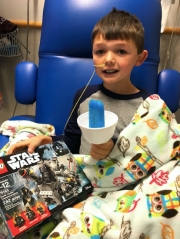Encopresis: Brayden's Story
Published on
Published on
Ever since he was a baby, Brayden struggled with severe constipation. His belly was distended and it was extremely painful for him to have a bowel movement. His family sought help from doctor after doctor, and even the emergency department when his pain was most severe, but still Brayden's symptoms persisted. Local clinicians didn't seem to take the family's concerns seriously, instead blaming Brayden's symptoms on his diet or swallowing air.
 After years of conflicting information and treatment plans, Brayden's family traveled hours to Children's Hospital of Philadelphia (CHOP). Finally, CHOP doctors were able to correctly diagnose his condition, begin treatment he desperately needed, and discover the genetic link that could help others suffering from the same condition.
After years of conflicting information and treatment plans, Brayden's family traveled hours to Children's Hospital of Philadelphia (CHOP). Finally, CHOP doctors were able to correctly diagnose his condition, begin treatment he desperately needed, and discover the genetic link that could help others suffering from the same condition.
Seemingly minor medical complaints can have devastating consequences when they’re chronic and severe, Brayden's family learned. "He had constant constipation from the time he was born,” says his mom, Danielle.
At first, she wasn't too alarmed as many babies have short periods of constipation. But as Brayden grew, his belly became distended as the waste matter collected in his colon and rectum. And, as often happens with chronic constipation, waste that wasn’t blocked would expel as diarrhea.
Over the years, Danielle took Brayden to several local doctors to find answers. Brayden was diagnosed with encopresis, but doctors couldn't determine the cause of his constipation. Some children develop encopresis because of poor diet, lack of exercise, stress and other reasons, but Danielle said that wasn't the case with Brayden.
Despite his condition, Brayden began school with his peers. He earned A's in school and enjoyed playing several sports, but he also felt sick all the time. And eventually, having to frequently rush to the bathroom began to have a serious effect on his daily activities.
Again, Brayden's family sought answers.
This time, a specialist at a larger hospital near Brayden's home in Montrose, PA, performed several tests and discovered the boy's colon (also known as the large intestine) was twice as large as an average adult's colon. It was also not properly expelling waste. Brayden was diagnosed with a gastrointestinal (GI) motility disorder.
Specialists at three hospitals struggled to find a treatment plan that worked for Brayden.
“It was incredibly frustrating,” Danielle says. “He was so sick he missed 63 days of school that year. As a parent, I didn’t know how to help him. They kept sending us to places that didn’t know what to do.”
Finally, one of Danielle's family members suggested contacting Children's Hospital of Philadelphia (CHOP) where gastroenterologists with special expertise in motility diseases have been evaluating and treating pediatric patients for years.
 At CHOP, Brayden saw Robert Heuckeroth, MD, PhD, a pediatric gastroenterologist in the Division of Gastroenterology, Hepatology and Nutrition.
At CHOP, Brayden saw Robert Heuckeroth, MD, PhD, a pediatric gastroenterologist in the Division of Gastroenterology, Hepatology and Nutrition.
Brayden had another series of tests, including colonic manometry to measure the strength of his colon contractions. The tests established which part of his colon wasn’t working, but clinicians still didn’t know why.
Dr. Heuckeroth discussed treatment options with Brayden and his family. Because of the severity of Brayden’s condition, they mutually agreed a bowel diversion surgery would produce the best results for him at that time.
It was not a decision made lightly, and Dr. Heuckeroth made sure Brayden and his family fully understood what the surgery would entail and that Brayden would have an ostomy bag collecting his waste for the foreseeable future.
“Dr. H. is unlike any doctor I’ve met before," Danielle says.
“He talks to Brayden directly, asks him questions directly, explains things to him directly. ”
Edward J. Doolin, MD, FACS, FAAP, a pediatric surgeon, performed Brayden's surgery, creating an opening (stoma) on Brayden's abdomen to bypass the non-working portion of his colon.
“He did really well after surgery,” Danielle says. “After we came home, I had never seen his stomach so flat. He had more color in his face; more energy in his step.”
Brayden didn’t love his ostomy bag, but medically, his condition was improving. Then one day at dinner, he started to complain that his belly felt funny.
Minutes later, Brayden was visibly upset. Danielle took him to the bathroom, thinking he needed to change the ostomy bag. What they discovered turned out to be far worse: Brayden was experiencing prolapse through the ostomy.
His colon was pushing out of his body and filling the ostomy bag. Prolapse is a rare complication to bowel diversion surgery — and rarely happens to the degree that occurred to Brayden.
“I was watching it actively push out of his body. I was afraid for my son’s life,” Danielle says. She rushed Brayden to a local hospital and eventually to another hospital two hours away where doctors were able to put Brayden under anesthesia to put the prolapsed section back and eventually stabilize him. The next day, the pair headed back to CHOP for corrective surgery.
At CHOP, doctors explained the ostomy could prolapse again — and the next time the result could be far more serious — or they could reverse the ostomy surgery.
By removing the nonfunctional section of Brayden's colon, and reconnecting his bowel, doctors were hopeful Brayden's shortened colon could do the work of his entire colon. Brayden's family chose to reverse the ostomy.
Slowly, Brayden's health began to improve. But the entire experience left Brayden a bit shell-shocked. "I was really depressed after my surgery and from not feeling well for so long," Brayden says.
With the help of CHOP's Child Life specialists, Brayden began to emotionally heal as he grew physically stronger. “I really liked the Child Life specialists,” Brayden says.
“They played games with me and made me feel happy again.”
As Brayden recovered, doctors at CHOP learned that Brayden’s mom, grandmother and siblings all have less severe, chronic constipation. Doctors encouraged Brayden and his mother to have genetic testing performed at the Roberts Individualized Medical Genetics Center to determine if a genetic difference was responsible for their condition.
Tests revealed both mother and son have a “Rad21” mutation, which has been linked to colon issues. However, there's still a lot to learn about the mutation and its effects. Eventually, other members of the family will be tested as well.
"It's a start of answer about why this happened to Brayden," Danielle says. “I’m looking forward to working with Dr. Deardorff on the genetics side of it. The whole team is just incredible.”
Now fully recovered, 11-year-old Brayden is thriving. He’s back in school and has been cleared to play all sports — although he says he’s sticking to golf until he regains more strength.
He’s not out of the woods: His remaining colon must be monitored long term; he has minor food limitations and uses laxatives occasionally, but his condition no longer interferes with his daily activities.
“I feel a lot better now,” Brayden says. “I have to be a little careful about not eating too much of certain foods, but that’s all … it’s not like before.”
Danielle sees a complete change in her son.
“I have my laughing Brayden back; the one who will leave my side and explore the world,” she says.”
“I’m so incredibly grateful that he’s back to himself and I’m looking forward to seeing him grow to his full potential.”